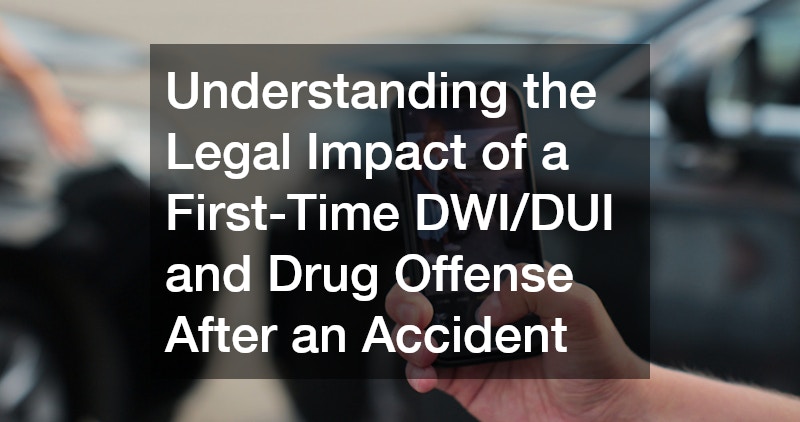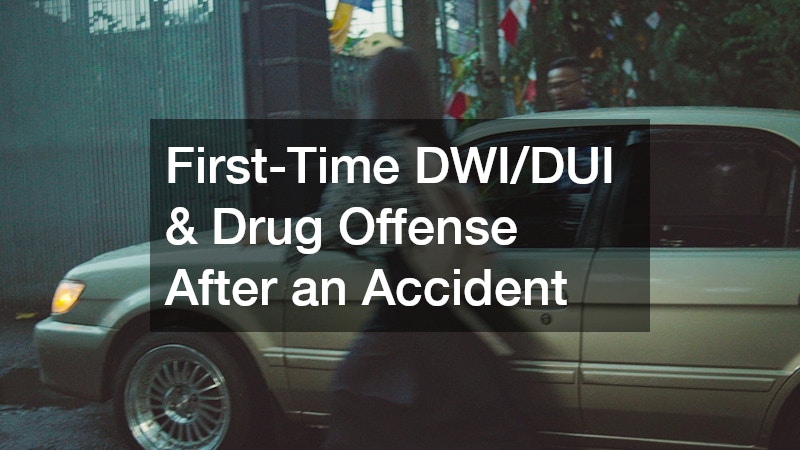- Act quickly after arrest: Contact an experienced DWI/DUI and drug defense attorney immediately to protect your rights and manage both criminal and insurance implications.
- Understand the charges: A first-time offense involving drugs or an accident can lead to criminal, civil, and insurance consequences — including license suspension, fines, and possible lawsuits.
- Don’t face insurers alone: Always consult your lawyer before speaking with insurance adjusters to avoid self-incrimination or denied claims.
- Evidence matters: Field sobriety tests, BAC levels, and lab reports can be challenged for errors, especially when handled improperly.
- Orphaned legal issues: Failing to attend court or complete mandatory programs can worsen penalties and delay license reinstatement.
- Insurance fallout is severe: Expect premium increases or policy cancellations, and understand SR-22/FR-44 filing requirements if applicable.
- Rehabilitation and compliance: Completing treatment programs, community service, and probation successfully can help restore your record and driving privileges faster.
Understanding the Legal Impact of a First-Time DWI/DUI and Drug Offense After an Accident

Facing a first-time DWI (Driving While Intoxicated) or DUI (Driving Under the Influence) charge is stressful enough — but when drugs or an accident are involved, the legal consequences can escalate rapidly. If you’re wondering, “Can you suggest attorney experienced with DWI and drug charges?”, the short answer is yes — you need one immediately.
A first-time DWI/DUI offense after a traffic accident often involves multiple legal layers: criminal penalties, civil liability, insurance complications, and potential long-term driving restrictions. Understanding how these elements interact will help you make the right legal and personal decisions in the critical days following an accident.
This article will guide you through every major step — from securing an attorney to dealing with insurance adjusters — and help you navigate your next moves with clarity and confidence.
What Happens Immediately After a DWI or Drug-Related Accident
In the moments after a DWI or drug-related accident, confusion and fear are common reactions — but your immediate actions can heavily influence the outcome of your case. When police officers arrive, they will begin an investigation to determine whether alcohol or drugs played a role in the crash. Expect field sobriety tests, breathalyzers, and possibly blood or urine analysis. If impairment is suspected, you’ll likely face arrest and vehicle impoundment. Your license could also be suspended within days under administrative laws that act independently of criminal proceedings.
For drivers unfamiliar with the process, this initial stage can feel overwhelming. The key is not to panic or make incriminating statements. Exercise your right to remain silent and request an attorney before answering questions about substances, medication, or prior consumption. These statements can later be used against you in both criminal and civil cases.
If injuries occurred or property was damaged, your case might escalate from a misdemeanor DWI to a felony offense, especially if drugs were found in your system. Knowing what to expect — from the booking process to your first court appearance — helps you stay in control. Contacting a qualified attorney early ensures evidence like dashcam footage, accident photos, and witness statements are preserved, which can be crucial in building your defense. Ultimately, the hours immediately following an arrest are some of the most critical for protecting your license, your insurance standing, and your reputation.
The Initial Police Response and Arrest Process
When law enforcement responds to an accident and suspects impairment, they typically:
-
Conduct field sobriety tests (balance, coordination, and attention).
-
Administer a breathalyzer or chemical test for drugs or alcohol.
-
Review evidence at the scene, such as open containers, prescription bottles, or witness statements.
If your results exceed the legal blood alcohol content (BAC) limit — typically 0.08% for adults — or if drugs are detected, you will likely be arrested on the spot.
You may also be charged with:
-
DWI/DUI (driving while intoxicated or under influence)
-
Possession of controlled substances
-
Reckless driving or vehicular assault if injuries occurred
Vehicle Impoundment and License Suspension
After arrest, your vehicle may be towed or impounded, and your driver’s license is usually confiscated. In most states, this triggers an administrative license suspension (ALS) that begins even before your court hearing.
You typically have 10–15 days to request a hearing to contest the suspension. Missing this window can automatically result in a temporary loss of driving privileges.
Booking and Court Appearance
You’ll undergo fingerprinting, mugshots, and basic medical checks. Soon after, you’ll be given a court date for arraignment, where formal charges are presented.
At this stage, having an experienced DWI and drug defense attorney can drastically improve outcomes by:
-
Negotiating for reduced charges (e.g., reckless driving instead of DWI)
-
Challenging the validity of sobriety or drug tests
-
Ensuring your rights were not violated during arrest or testing
Why Legal Representation Is Critical in DWI and Drug Offense Cases
Hiring a skilled defense attorney is not optional — it’s essential. The laws surrounding DWI, DUI, and drug offenses are complex, and even a minor oversight can result in harsh penalties such as fines, license suspension, or jail time. An attorney experienced in both DWI and drug charges understands how to analyze arrest procedures, identify constitutional violations, and interpret toxicology results. They know how to challenge unreliable testing devices, contest unlawful traffic stops, and question improper police conduct.
Beyond defending you in court, your attorney serves as your strategic advisor. They communicate with prosecutors to negotiate reduced charges or plea deals, represent you at administrative license hearings, and coordinate with your insurance provider to protect your coverage. Without experienced representation, you risk making statements or procedural mistakes that strengthen the prosecution’s case.
Furthermore, legal counsel can help you access diversion or rehabilitation programs available for first-time offenders — pathways that can help you avoid a permanent criminal record. These programs often require timely applications and structured compliance, which your attorney will manage on your behalf.
If you’re uncertain where to start, asking “Can you suggest attorney experienced with DWI and drug charges?” is the right question. Look for a professional with strong courtroom experience, client testimonials, and a background in accident-related DUI cases. Their expertise can mean the difference between a brief legal setback and a long-term conviction.
How a DWI Attorney Builds Your Defense

Your lawyer’s job isn’t just to minimize penalties — it’s to protect your constitutional rights and help you avoid long-term damage to your record. An attorney experienced with both DWI and drug charges will:
-
Examine arrest procedures for unlawful stops or testing errors
-
Review chemical test results for calibration or contamination issues
-
Challenge the officer’s observations, especially if caused by fatigue, medication, or injury rather than impairment
-
Negotiate plea deals to minimize fines, jail time, or license suspension
-
Coordinate with insurance adjusters to manage liability exposure
📘 High-Authority Reference: FindLaw: DWI/DUI Overview
Public Defenders vs. Private Attorneys
While public defenders are competent, their high caseloads may limit personalized attention.
A private DWI attorney often has specialized experience with:
-
Toxicology and BAC testing science
-
Local court procedures and judges
-
Negotiating with prosecutors for diversion or rehabilitation programs.
Understanding the Legal Penalties for First-Time DWI and Drug Offenses
Even as a first-time offender, a DWI or drug-related charge carries significant legal consequences that can reshape your life for years. Most states impose a combination of criminal, administrative, and financial penalties. These often include fines between $500 and $2,000, license suspension ranging from 90 days to a full year, mandatory attendance in alcohol education or drug treatment programs, and in some cases, probation or community service.
However, the situation worsens if an accident caused injury or property damage. Prosecutors may upgrade your charge to a felony DWI, which comes with harsher sentences such as extended license revocation, larger fines, and potential jail time. Additionally, if drugs were involved, you could face separate possession or paraphernalia charges.
Courts also consider aggravating factors like high BAC levels, minors in the vehicle, or previous traffic violations. These can quickly push a case from a manageable misdemeanor to a major offense. A conviction can have ripple effects — including employment difficulties, higher insurance premiums, and a permanent criminal record.
It’s important to remember that DWI penalties are not limited to what happens in the courtroom. Many states require ignition interlock devices (IIDs), which prevent your car from starting until you pass a breath test. Judges may also impose rehabilitative sentencing, emphasizing education and counseling over punishment.
Working with an experienced DWI and drug attorney can help minimize these penalties and secure the best possible resolution. They’ll evaluate your case for procedural errors or testing inaccuracies and, if possible, argue for reduced charges, dismissal, or a conditional discharge that keeps your record clean.
Penalties vary by state but often include:
-
License suspension: 90 days to 1 year
-
Fines: $500–$2,000
-
Jail time: Up to 6 months (often reduced or suspended for first-time offenders)
-
Probation: 6 months to 2 years
-
Mandatory education or treatment programs
Additional Penalties if an Accident Occurred
If the DWI/DUI caused property damage, injury, or death, penalties can include:
-
Felony charges instead of misdemeanors
-
Restitution to victims
-
Civil lawsuits for personal injury or wrongful death
-
Increased insurance premiums or denial of coverage
High-Authority Reference: NHTSA: Drunk Driving Statistics
Insurance Implications After a DWI or Drug-Related Accident
The aftermath of a DWI or drug-related accident extends far beyond criminal charges—your insurance situation can change dramatically overnight. Once a DWI/DUI is on record, most insurance providers classify you as a “high-risk driver.” This often leads to skyrocketing premiums, non-renewal of policies, or even complete termination of coverage. If an accident resulted in injuries or property damage, insurers may also refuse to pay claims if intoxication violates the terms of your policy. In some states, you’ll be required to file an SR-22 or FR-44 form, a certificate that verifies financial responsibility before reinstating your driver’s license.
It’s important to act quickly after the incident. Notify your insurer promptly but avoid admitting fault or discussing the criminal details without consulting your lawyer. A skilled attorney can help you navigate communication with insurance adjusters, ensuring that your statements don’t jeopardize your coverage or defense. If you’re wondering, “Can you suggest attorney experienced with DWI and drug charges?” — choose one who has successfully managed both criminal defense and post-accident insurance negotiations. The right legal guidance can help mitigate premium hikes and prevent long-term financial strain following a conviction or accident.
How Insurers Respond
After a conviction or accident, insurance companies may:
-
Increase premiums by 80%–200%
-
Cancel your policy or refuse renewal
-
Deny claims if intoxication voids coverage clauses
Filing SR-22 or FR-44 Certificates
Some states require a special SR-22 or FR-44 certificate proving financial responsibility.
Failure to file it may lead to license revocation or extended suspension.
Building a Strong Defense Strategy
Building a Strong Defense Strategy
A solid defense is essential to minimize penalties and safeguard your rights after a DWI or drug-related charge. The first step is gathering evidence—dashcam footage, police reports, lab test results, and witness statements. Your attorney will scrutinize every aspect of the arrest, from whether the officer had probable cause to whether chemical testing procedures were properly followed. Even minor technical errors in these areas can lead to reduced or dismissed charges.
Moreover, a well-structured defense should consider all available alternatives such as plea negotiations, deferred adjudication programs, or rehabilitation-based sentencing. A proactive legal strategy also involves reviewing your personal and medical background to identify factors that could have influenced test results, like prescription medication or fatigue. Collaborating closely with your lawyer helps ensure every angle is covered. The more you communicate, the better your attorney can tailor a defense that highlights inconsistencies in the prosecution’s case while emphasizing your willingness to comply with treatment or education programs—key elements judges often view favorably in first-time offenses
A solid defense begins with a clear factual timeline and evidence review.
Below are the key steps your attorney may take.
Collecting and Preserving Evidence
-
Obtain police reports, dashcam footage, and lab test results
-
Interview witnesses to clarify your behavior before the accident
-
Inspect the testing devices for calibration logs and operator training
-
Check medical conditions or medications that could mimic intoxication
Exploring Alternative Sentencing Options
Many states offer first-time offender programs that reduce penalties upon completion:
-
Diversion programs (drug or alcohol education)
-
Community service
-
Interlock ignition device (IID) installation
-
Probation with counseling
These alternatives help avoid a permanent criminal record while showing accountability.
Civil Liability After a DWI/DUI Accident
Beyond criminal proceedings, a DWI or drug-related crash may expose you to civil liability if others were injured or suffered property damage. Victims can pursue compensation through personal injury lawsuits, and in cases involving intoxication, liability is often easier to establish under the principle of negligence per se. This means the act of driving under the influence itself can serve as proof of negligence, shifting the burden heavily against the defendant.
An experienced attorney will coordinate between your criminal and civil defenses to minimize conflicting statements and limit exposure. For example, your lawyer may negotiate settlements that prevent costly court battles or utilize insurance coverage to resolve claims efficiently. It’s also critical to act responsibly by cooperating with all post-accident requirements—reporting claims promptly, preserving evidence, and following any legal restrictions. Proper legal representation helps safeguard your finances, reputation, and ability to recover from the incident while addressing all civil and criminal dimensions simultaneously
Even if you resolve the criminal case, civil lawsuits may follow if others were injured or property was damaged.
Understanding Negligence Claims
Victims can sue for:
-
Medical expenses
-
Lost wages
-
Pain and suffering
-
Vehicle damage
A DWI conviction may automatically establish negligence per se, making defense harder.
Your attorney must therefore coordinate closely between the criminal and civil cases to minimize liability exposure.
Steps to Take Immediately After the Incident
1. Contact a Qualified DWI/Drug Attorney
Immediately consult an attorney who understands both DWI law and drug-related offenses.
Ask questions like:
-
Have you handled accident-related DWI cases?
-
What outcomes have you achieved for first-time offenders?
-
How will you handle both criminal and insurance proceedings?
2. Avoid Speaking to Insurance Adjusters Alone
Never admit fault or provide statements without legal counsel.
Insurance companies may use your words to reduce or deny your claim.
3. Attend All Court and DMV Hearings
Missing even one appearance can lead to:
-
Bench warrants
-
Automatic license suspension
-
Higher penalties
4. Complete All Required Programs Promptly
Comply with all court orders, including:
-
Alcohol or drug education
-
Treatment programs
-
Community service
Timely completion often improves outcomes during probation review.
Preventing Repeat Offenses and Restoring Your Record
Once you’ve faced a DWI or drug-related offense, the goal should be to prevent it from happening again and to rebuild your reputation. Completing court-mandated education, treatment, or counseling programs demonstrates accountability and can reduce penalties. Beyond compliance, consider enrolling in voluntary rehabilitation programs or joining support groups like Alcoholics Anonymous (AA) or Narcotics Anonymous (NA). Courts often view these proactive steps as evidence of personal growth, which may improve future legal or employment prospects.
Record expungement or sealing may also be possible depending on your jurisdiction. A lawyer can advise whether your first-time offense qualifies and help file the necessary petitions. Restoring your driving privileges and rebuilding your insurance record typically take consistent effort over a few years. However, with commitment, legal guidance, and responsible behavior, you can restore your standing and avoid the long-term consequences of repeat offenses.
Long-Term Reinstatement Steps
-
Complete all probation and fines
-
Reapply for your driver’s license
-
Maintain clean insurance records for 3–5 years
-
Seal or expunge your record if eligible
Rehabilitation and Counseling Options
Rehabilitation programs can strengthen your defense and reduce penalties.
Courts often look favorably upon voluntary enrollment in:
-
Substance abuse treatment
-
Driver safety programs
-
Support groups such as AA or NA
How Courts Handle Combined DWI and Drug Offenses
Cases involving both alcohol and drug impairment are among the most complex in traffic law. Courts treat them seriously because multiple substances often indicate higher impairment levels and potential risk to public safety. However, they also present more opportunities for defense due to the technical challenges of testing for drugs and alcohol simultaneously. Each substance requires a separate lab analysis, and errors in sample handling, chain of custody, or cross-contamination can create reasonable doubt.
Judges often consider several factors when sentencing—your BAC level, type of drugs detected, cooperation with law enforcement, and whether the accident caused injury or damage. First-time offenders who demonstrate remorse and complete rehabilitation programs may still receive probation or reduced penalties instead of jail time. Working with an attorney who understands the intersection of DWI, drug law, and accident litigation ensures that your defense addresses every scientific and procedural angle, increasing your chances of a fair and balanced outcome.
Dual Testing and Legal Complexity
Drug and alcohol charges require separate lab analysis, meaning more opportunities for error — and more defense options.
Your attorney can:
-
Request independent retesting
-
Challenge chain of custody
-
Identify prescription misuse defenses
Sentencing Trends
First-time offenders who cooperate, complete treatment, and show rehabilitation often receive probation or reduced sentences instead of jail time — especially when no serious injury occurred.
Conclusion: Moving Forward with the Right Legal Guidance
Facing a first-time DWI/DUI and drug offense after an accident can feel overwhelming, but it doesn’t have to define your future. The key to recovery lies in taking immediate, informed action — beginning with hiring the right legal representation. A knowledgeable defense attorney can help you navigate complex legal systems, challenge questionable evidence, and negotiate fair outcomes that protect your rights and minimize long-term consequences.
Understanding how your case fits within state laws and national standards is also crucial. For example, Nolo’s comprehensive guide on DWI/DUI laws explains how penalties vary across states and highlights why local expertise makes a major difference in your defense strategy. Meanwhile, resources like the Legal Information Institute’s overview of impaired driving statutes provide insight into how courts interpret offenses involving both alcohol and drugs.
Ultimately, whether you’re dealing with criminal charges, insurance disputes, or civil liability claims, professional legal counsel is your strongest ally. An experienced attorney who specializes in DWI and drug-related accident cases can help you make informed decisions that reduce your risk and safeguard your reputation. Take the first step today — consult a skilled defense lawyer who understands the intersection of criminal law, traffic regulations, and post-accident procedures to rebuild your future with clarity and confidence.



